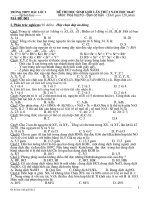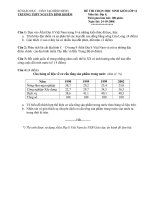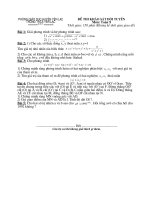Đề thi Hsg K11
Bạn đang xem bản rút gọn của tài liệu. Xem và tải ngay bản đầy đủ của tài liệu tại đây (212.3 KB, 15 trang )
Sở GD-ĐT Quảng Ninh kỳ thi chọn học sinh giỏi tỉnh lớp 11
Đề thi chính thức năm học 2003-2004
----------- ---------- o0o ---------
Chữ ký của giám thị
Môn: Tiếng Anh (bảng B)
Thời gian làm bài: 180 phút, không kể thời gian giao đề.
SBD:
1: Ngày thi:
Họ, tên thí sinh: Số phách:
Ngày sinh:
2: Nơi sinh:
Học sinh trờng:
----------------------------------------------------------------------------------------------------------
Điểm bài thi: Bằng số: . (Bằng chữ: .. ........ )
Chữ ký của hai ngời chấm thi:
1: 2: .... . .
Số phách:
Ghi chú: Thí sinh trả lời ngay vào đề thi này. Nếu viết sai phải gạch bỏ rồi viết lại.
I- listening: (3 points)
Part 1. Listen to the questions on the cassette and put a tick next to the right answer for each
one. The first one has been done for you as an example.
1. A. OK.
B. I can.
C. Yes, thank you.
2. A. No, not very long. Only a few minutes.
B. It was ten minutes to eleven.
C. I was waiting outside the room.
3. A. I dont know the exact time.
B. It was just starting to rain.
C. Yes, I like this kind of weather very much.
4. A. Including my own language? Three altogether.
B. Ive been studying English for four years.
C. No, I cant speak it very well.
5. A. Its about one kilometre.
B. Yes, its very far away.
C. For more than five kilometres.
6. A. Ill take the bus to my school.
B. Yes, I sometimes miss the bus.
C. At the bus stop opposite the bank.
Part 2. Listen to the tape. If you agree with the statement, put a tick in the box under A (true).
If you dont agree, put a tick in the box under B (false). The first one has been done for you as
an example.
A B
1. The man wears jeans every day.
2. The woman agrees that the man should wear his jeans.
3. The woman wants to wear a red dress.
4. The man likes the red dress.
5. They both think there will be a lot of people at the party.
6. In the end, the man and the woman agree about what they
should wear for the party.
Part 3. Listen to the tape and fill in the gaps with the missing words.
1. You are in a department store. You want to buy a penknife like the one in the .................................
2. You are in a theatre. You want to reserve seats for the performance this .......................................
3. You are at the bus station. You want to find out about ............................................. of buses.
4. You are in a department store. You want to return a sweater which is too ........................................
5. You are at a bank. You want to ............................................ a traveller’s cheque.
II - use of english : (5 points)
Part1: Underline the correct word in the brackets to complete the paragraph below.
I wonder if you’ve ever stopped (1. considering/to consider) the amount of time you spend
(2. looking at/watching) television each day, or what people did before “the boy” was (3.
discovered/invented). (4.Weather/Whether) watching TV is time well spent is open to question.
The quality of the programmes (5. leaves/lets) a lot to be desired. One of the criticisms often
levelled (6. at/to) television is that it’s killing the art of conversation. As far as I’m concerned,
I’d much rather spend an evening socialising with friends than sit glued to the box. However, I
seem to be in the minority (7. that/which) I think is a shame. What really (8. gets/lets) me
down is the commercial (9. brakes/breaks). In spite of the fact that I’m not a TV fan, I do
enjoy going to the cinema. (10. However/Moreover), with the arrival of video recorders, a lot
of cinemas have now been closed down or converted into bingo halls.
Part 2 : Fill in the gaps with a, an, the or 0 (no article) correctly.
1) ............... page of .................... book is torn and the cover looks very old.
2) I would like to have a house in ................... country with .................. swimming pool.
3) They often play .................. game of tennis in ................. afternoon.
4) .................youngest brother is old enough to go to .................. school now.
5) This plane can fly from the North to the South of ................... country in ...............…
hour or two.
Part 3 : Fill in the gaps with the most suitable prepositions to complete the letter.
Dear Mr Markham,
Thank you very much for your letter (1) .................. 14
th
March. Naturally I am delighted,
and very excited at the prospect of my holiday (2) ............... Britain.
I would like to take my holiday (3) ....................... 15
th
June (4) ................... 5
th
July, which
I believe is the time (5) .................... the Wimbledon tennis championships, and I would be
very grateful if you could arrange (6) ......................... me to see some of the matches. I would
also like to see some test cricket. There will be no football then, but perhaps I could spend a
day (7) ...................... the races at Ascot,too.
The places I would like to visit are the university towns (8) ...................... Oxford and
Cambridge, where I would like to see one of Shakespeare's plays, and if possible I would
really love to visit an old English village (9) ...................... a typical country pub.
I am very grateful to you and the company (10) ....................... giving me this opportunity
of a lifetime.
Yours sincerely.
Joseph Degama
Part4 Use the correct forms of the words on the right to fill in the gaps in the following
paragraph correctly.
In Britain, there were (1) .......................... newspaper articles about
the film and how it was made. Snow White toys and books were on
(2) ............................ everywhere. Some people thought that it might be
(3) ............................. for children, but most people saw it was
(4) ............................ entertainment.
Since 1937 it has been re-issued every few years, giving
(5) .......................... to many generations of children.
day
sell
upset
harm
enjoy
III - Reading: (6 points)
Part 1: Fill in each gap in the following paragraph with ONE suitable word.
The British Museum library is (1) ....................... of the largest libraries in the world. It
has a copy of every book (2) ....................... is printed in the English language, so that there are
more than six million books (3) .......................... They receive nearly two thousand books and
papers every day.
The British Museum library has a very big (4) ....................... of printed books and
manuseripts (5) ....................... they keep in glass cases. You can also find there some of the
first English books printed by Caxton. Caxton was a printer (6) ....................... lived in the
fifteenth century. He made the first printing-press in England.
In the reading room of the British Museum library many (7) ...................... great men
have read and studied. You know that V.I. Lenin visited London several times (8) .....................
he lived in England. He spent a lot of time in the British Museum library. (9) .....................
great man was Karl Max who (10) ......................... works which have had the greatest influence
on the politics of the modern world.
Part 2 : Read the text below and choose the correct word for each gap. Circle the letter next to
the correct word - A, B, C or D.
SALLY
After two weeks of worry, a farmer in the north of England was very happy yesterday.
James Tuke, a farmer who (1) ............. sheep, lost his dog, Sally, when they were out
(2) ........... together a fortnight ago.
" Sally was running (3) ............. of me, " he said, "and disappeared over the top of the hill.
I whistled and called (4) ............ she didn't come. She is young, so I thought perhaps she had
gone back to the farmhouse (5) .......... her own. But she wasn't there. Over the next few days I
(6) ......... as much time as I could looking for her. I was afraid that I would never see her
(7) ........... Then a neighbour said she had heard an animal crying while she was out walking
near the (8) ............ of a cliff. I rushed out and found Sally on a shelf of rock halfway down.
She was thin and (9) ............ but she had no (10) ............ injuries. She was really lucky ! "
1) A goes B grows C keeps D holds
2) A working B worked C work D works
3) A behind B beside C ahead D around
4) A but B so C and D even
5) A by B on C with D of
6) A used B spent C gave D passed
7) A more B again C further D after
8) A edge B side C border D height
9) A poor B dull C weak D broken
10) A strong B hard C rough D serious
Part 3: Read the text and questions below then choose the best answer. Circle the letter- A, B, C
or D next to the right answer.
When I opened the first "Body Shop" in 1976 my only object was to earn enough to feed
my children. Today "The Body Shop" is an international company rapidly growing all around
the world. In the years since we began I have learned a lot. Much of what I have learned will be
found in this book, for I believe that we, as a company, have something worth saying about
how to run a successful business without giving up what we really believe in.
It is not a normal business book, nor is it just about my life. The message is that to
succeed in business you have to be different. Business can be fun, a business can be run with
love and it can do good. In business, as in life, I need to enjoy myself, to have a feeling of
family and to feel excited by the unexpected. I have always wanted the people who work for "
The Body Shop" to feel the same way.
Now this book sends these ideas of mine out into the world, makes them public. I'd like
to think there are no limits to our "family", no limits to what can be done. I find that an
exciting thought . I hope you do, too.
1) What is the writer's main purpose in writing this text ?
A to tell the reader her life story
B to introduce her ideas to the reader
C to explain how international companies operate
D to tell the reader how she brought up a family
2) What would someone learn from this text ?
A how to make a lot of money
B how to write a book about business
C what the writer's family is like
D what the writer's book is about
3) How does the writer feel about the business she runs ?
A She doesn't care about success if her children are fed.
B She just runs it for her own entertainment.
C It is not like any other companies.
D It is likely to become even more successful.
4) What kind of workers does the writer like to employ ?
A workers who can explain her ideas
B workers who get on well with the public
C workers who have the same attitudes as she does
D workers who have their own families
5) What kind of person does the writer seem to be ?
A She seems to be someone with strong opinions.
B She doesn't seem to be very confident.
C She is mainly interested in making money.
D She seems running a business as just a job.
IV - Writing: (5 points).
Part 1: Finish each of the following sentences in such a way that it means exactly the same as
the sentence printed before it.
1) The nurses' home is behind the hospital.
The hospital ......................................................................................................................
2) My appointment with Dr Gibson is at ten o'clock.
At ten o'clock I have .......................................................................................................
3) It would be a good idea to take more exercise.
He advised me ..................................................................................................................
4) They built the bridge in 1990
The bridge ........................................................................................................................
5) He can’t buy a watch because he doesn’t have enough money.
If he ..................................................................................................................................
6) How much does the book cost ?
How much ........................................................................................................................ ?
7) His shirt is more expensive than my shirt.
My shirt doesn't ................................................................................................................
8) I feel very difficult when I speak English.
It is difficult .....................................................................................................................
Part 2 : Use the given words or phrases below to write the correct sentences.
1) My friend's / mother / work / the library / my school //
.........................................................................................................................................
2) it / be / rather small / well - equiped //
..........................................................................................................................................
3) so / she / be busy / all the day long //
........................................................................................................................................
4) she / always / stand / her desk //
........................................................................................................................................
5) she / be / ready / serve those / who come there / read books //
.......................................................................................................................................
6) after / receive / readers' library-cards / she / help them / find the books / they / want /
to borrow //
.......................................................................................................................................
.......................................................................................................................................
7) she / always / feel happy / satisfy / the readers' demands //
.......................................................................................................................................
Part 3 : Write a paragraph (about 120 words) to compare the differences between the city and
the country about the people and their life.
..........................................................................................................................................................................
.......................................................................................................................................................................................
.......................................................................................................................................................................................
.......................................................................................................................................................................................
.......................................................................................................................................................................................
.......................................................................................................................................................................................
.......................................................................................................................................................................................
.......................................................................................................................................................................................
............................................................................................................................................................ ..........................
.......................................................................................................................................................... ............................
.......................................................................................................................................................................................
.......................................................................................................................................................................................
.......................................................................................................................................................................................
...............................................................................................................
----------- the end ----------
Sở GD-ĐT Quảng Ninh kỳ thi chọn học sinh giỏi tỉnh lớp 12
Đề dự bị năm học 2003-2004
----------- --------- o0o ---------
Chữ ký của giám thị
Môn: Tiếng Anh (bảng A)
Thời gian làm bài: 180 phút, không kể thời gian giao đề.
SBD:
1: Ngày thi:
Họ, tên thí sinh: Số phách:
Ngày sinh:
2: Nơi sinh:
Học sinh trờng:
----------------------------------------------------------------------------------------------------------
Điểm bài thi: Bằng số: . (Bằng chữ: .. ........ )
Chữ ký của hai ngời chấm thi:
1: 2: .... . .
Số phách:
Ghi chú: Thí sinh trả lời ngay vào đề thi này. Nếu viết sai phải gạch bỏ rồi viết lại.
I- listening: (4 points)
Part 1. Look at the questions for this part. You will hear a woman giving details about the
weeks activities at a camp. Put a tick ( ) next to the correct answer for each question.
Number 1 has been done for you as an example.
1. The rock climbing class meets
2. Lunch starts at
3. The horse riding group
4. Disco dance classes are held in the
5. If you want to change your course, you must
6. In good weather
A. by the pool.
B. in the car park.
C. by the tennis courts.
D. in the gym.
A. 12.00
B. 12.30
C. 13.00
D. 13.30
A. leaves from the bus stop.
B. arrives back at the main gate.
C. has to walk back from the lesson.
D. returns by bus for lunch.
A. open air.
B. practice rooms.
C. music studio.
D. drama hall.
A. sign another form.
B. inform your teacher.
C. tell your group leader.
D. wait until the evening
A. everyone is given a picnic lunch.
B. lunch is cooked out of doors.
C. everyone can take their trays outside.
D. group leaders bring a picnic







